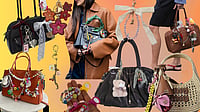Imagine following an elaborate skincare routine simply because someone online claimed it would give you perfect skin. That was me stepping into yet another Gen Z scenario. However, this time, it's not just about pursuing flawless skin.
It's about the fear of aging—a fear deeply rooted in societal expectations, career uncertainties, and the dread of becoming irrelevant in our fast-paced digital age.
Commenting on the same, a Gen Z student explained, "There's this constant pressure to be successful and make a mark at a young age. Aging feels like a ticking clock, and if you haven't achieved certain milestones by a certain age, you're made to feel like you're falling behind."
Also, social media plays a significant role in shaping our perception of aging. The curated images of influencers, seemingly immune to the passage of time, set an unrealistic standard that is both inspiring and intimidating. With the hashtag #antiageing boasting a staggering 7.4 billion views on TikTok, it's evident that the fear of aging has taken center stage in the minds of Gen Z.
A 22-year-old content creator shared, "We're bombarded with images of people who seem to defy aging, and it makes us question our worth as we get older. It's like we're expected to be ageless."
She further added, "We grew up in a world where everything changes so quickly. The pressure to constantly adapt and reinvent ourselves is intense. Aging feels like losing control over that process, and that scares us."
As reported by the Business of Fashion (BOF), Paris-based dermatologist Diala Haykal notes that Gen Z's response to these fears is the rise of "prejuvenation"—a focus on preventive measures rather than corrective solutions.
This shift represents the most significant change in cosmetic dermatology over the past two decades. The skincare industry has swiftly adapted to this demand, with a 10 percent rise in products referencing anti-aging over the past two years, according to Trendalytics.
Searches for sunscreen have more than tripled, and the market now boasts nearly three times as many sunscreen products compared to three years ago. Gen Z-focused brands like E.l.f Beauty have introduced products like retinoids, while Bubble launched an eye cream in response to the surging demand for preventative measures.
Facial plastic surgeon Paul Nassif, renowned for his role on the E! series "Botched," noted a growing trend among younger individuals opting for peels, facials, and occasional laser treatments. Rather than presenting images of celebrities during consultations, Gen Z is more likely to bring photos of themselves, often with a filter applied.
Speaking of the filter trend, the viral aged filter, which provides a glimpse into the future, generated a whopping 24.5 million posts, even catching the attention of celebrities like Kylie Jenner.
Meanwhile, solutions like Frownies, silicone anti-wrinkle pads, jaw-lift chin straps, face tape for "fox eyes," and radio-frequency devices like NuFace have become ubiquitous in the quest to turn back the hands of time.























